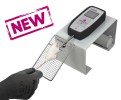Authors
D. Nieoczym, K. Soca_a, J. _uszczki, S. Czuczwar, P. Wlaz.
Lab
Maria Curie-Sk_odowska University, Institute of Biology and Biochemistry, Department of Animal Physiology, Lublin, Poland.
Journal
Journal of Neural Transmission
Abstract
The aim of the present study was to investigate the effect of sildenafil, a selective phosphodiesterase 5 (PDE5) inhibitor, on threshold for clonic seizures in mice. In addition, the effects of sildenafil on the anticonvulsant activity of selected antiepileptic drugs (AEDs), i.e., clonazepam (CZP), valproate (VPA), phenobarbital (PB), ethosuximide (ETS) and tiagabine (TGB), were also evaluated. The subcutaneous pentylenetetrazole (PTZ) test was used to determine the effects of sildenafil on convulsive susceptibility and the anticonvulsant activity of the studied AEDs in mice, while the acute side effects of sildenafil and its combinations with the studied AEDs were evaluated in the chimney test, step-through passive-avoidance task and grip-strength test in mice. Total brain concentrations of AEDs were also determined. Sildenafil (5-40 mg/kg) did not influence the threshold for PTZ-induced clonic seizures in mice, but increased the anticonvulsant activity of ETS in this test without any significant changes in the total brain concentration. The activity of the remaining AEDs was not significantly changed by sildenafil. Neither sildenafil alone nor its combinations with the studied AEDs produced any changes in the motor coordination, long-term memory and muscular strength in mice. Co-administration of sildenafil with ETS in male epileptic patients with co-existing erectile dysfunctions might lead to the pharmacodynamic interactions that may be beneficial for the patients. Combinations of sildenafil with CZP, VPA, PB and TGB appear to be neutral in terms of their influence on seizures.
BIOSEB Instruments Used:
Grip strength test (BIO-GS3)

 Douleur - Allodynie/Hyperalgésie Thermique
Douleur - Allodynie/Hyperalgésie Thermique Douleur - Spontanée - Déficit de Posture
Douleur - Spontanée - Déficit de Posture Douleur - Allodynie/Hyperalgésie Mécanique
Douleur - Allodynie/Hyperalgésie Mécanique Apprentissage/Mémoire - Attention - Addiction
Apprentissage/Mémoire - Attention - Addiction Physiologie & Recherche Respiratoire
Physiologie & Recherche Respiratoire
 Douleur
Douleur Système Nerveux Central (SNC)
Système Nerveux Central (SNC)  Neurodégénérescence
Neurodégénérescence Système sensoriel
Système sensoriel Système moteur
Système moteur Troubles de l'humeur
Troubles de l'humeur Autres pathologies
Autres pathologies Système musculaire
Système musculaire Articulations
Articulations Métabolisme
Métabolisme Thématiques transversales
Thématiques transversales SFN2024: Venez rencontrer notre équipe sur le stand 876 à Chicago
SFN2024: Venez rencontrer notre équipe sur le stand 876 à Chicago 